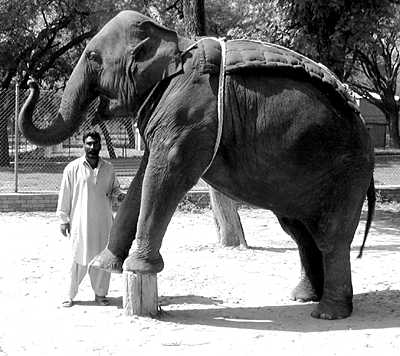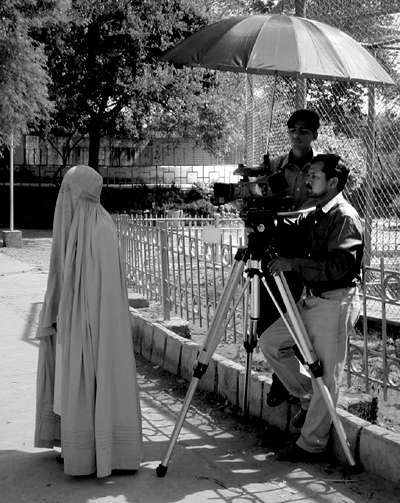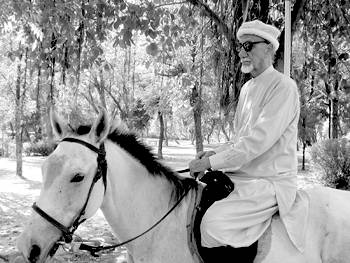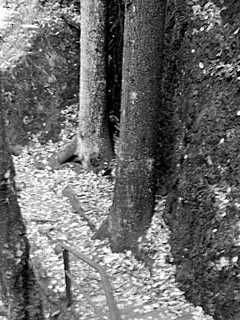|
|

|
|||
|
|
Present Past Subjects Projects Misc |
OCTOBER 2002
(Islamabad) "Was there a crossing of the imaginary line during the zoom in, so that, imperceptibly to us, it became a zoom out (a labyrinthine structure)?" (Jalal Toufic) Woke up yesterday and decided to shoot the material for a short film during the time I have left here. The piece will be roughly based on the Tale of the Prince and the Ogress and will feature (as the prince) Taimur Afzal Khan, an extraordinary 87 year old gentleman, Aliya Chinoy and a 12 year old elephant named Sahaily. Spent the morning in the Zoo and the afternoon in Rawalpindi searching the markets for two Afghani burkas (harder to find than one would imagine).
Sahaily and Mohammed Bilal, one of her three mahouts (keepers). (Islamabad) Simple pleasures. As far as I'm concerned the highlight of Sam and Adil's sumptuous dinner party this evening was the lemonade flavored with fresh pulverised mint. (Islamabad) The Blind Men and the Elephant. "It does illustrate well the Jain doctrine of Anekanta, the manysidedness of things." (Islamabad)
(Islamabad) Between rehearsals with Taimur and Aliya I returned to the zoo to shoot some extra material. With the help of the director, Mr. Alam, I arranged to enter the Hog Deer (Axis porcinus) and Steppe Eagle (Aquila nipalensis) enclosures. I got the shots I wanted with the skittish Hog Deer, though I'm not sure about the Eagle footage (I had hoped to catch them feeding but they refused to eat as long as I was present). (Islamabad) Been very busy with the film project. Today was our final shooting day.
Aliya Chinoy as the 'Princess - Ogress.' (Islamabad) Final day in Islamabad.
7.10.02: Taimur Khan as the 'Prince.' Read John Gardner's Freddy's Book on the long and tiring journey home today (the trip was especially long and tiring because it was interrupted by long and tiring stops in Abu Dhabi and London). Freddy's Book, like Henry James 'The Turn of the Screw' features a 'dangling matrix narrative' (i.e. the initial framing narrative is never returned to or closed -- see Alamut entry 14.05.02) and a Devil who is chiefly characterised by his inability to concentrate. What happened to the summer? Just a few weeks ago we were lying on the beach. Today has all the makings of a warm fall day, it's clear and the sun is out, but it is also bitterly cold -- much colder than it should be for such a day in October. A welcome home present? In the post today I received a copy of James Stevens Curl's Death and Architecture. From Bhikku. Thanks. (Köln) Persian Food Had lunch with N. at Restaurant Zarathustra, Dasselstrasse 4, 50674 Köln. (This was an excellent lunch at a restaurant which name-wise now appears even more meaningful than it appeared at the time.) Watched Bimal Roy's Madhumati (1958). Madhumati reviewed at Upperstall.com and Rediff.com. During the fall everything falls in place. I've returned home after a perfect weekend with N. in Köln just in time to experience a perfect fall (rainy) morning and very fine telephone conversations with both the boy and Jente. (And good news from the Fonds voor Beeldende Kunsten, Vormgeving en Bouwkunst.) Researching my proposal for a Zero-G flight I've come across another psychoanalytic take on escapology, (besides Bernard C. Meyer's out of print classic Houdini: A Mind in Chains), Adam Phillips' Houdini's Box: The Art of Escape. Considering issues of escape, who these days, venturing into a new subject online, is not overwhelmed and intimidated by the sheer volume of available information? This evening, after a few hours browsing a slew of escapology and (admittedly rather tacky) escape-artist equipment sites both my browsers have run out of memory with about a zillion windows open. To run out of memory is the modern devil (the same Devil who can't concentrate, or as indisicipline incarnate, gorges him/herself on too much material and then pukes). Cannon's Great Escapes. "Escape artist/escapology supplies such as handcuffs, straitjackets, chains and padlocks." Cannon's seems to be one of the better supply houses. A rather complete Escape Artist Book List. The Science of Misdirection Following more research into the ways and means of 'stage escapology' I've stumbled across another interesting title, 'Magic in Theory: an Introduction to the Theoretical and Psychological Elements of Conjuring.' (1999, University of Hertfordshire Press) by Peter Lamont and Richard Wiseman, two psychologists renowned for their careful unraveling of the Indian Rope Trick. More on Indian magic: Lee Siegel, Net of Magic: Wonders and Deception in India. Why do we tend to see escapology primarily in terms of space, that is as an (attempt to) escape from a particular space? Temporal Bardos Stephanie Samler, Peter Greenaway and Nietzsche's Eternal Return. David Lavery, "Same-o, Same-o": Eternal Recurrence in Groundhog Day. A quote from J. W. Dunne's Experiment with Time (1927) found on a page of Flann O'Brien notes:
Updated my escapology list. Nietzsche: "I would believe only in a god who could dance. And when I saw my devil I found him serious, thorough, profound, and solemn: it was the spirit of gravity - through him all things fall. Not by wrath does one kill but by laughter. Come, let us kill the spirit of gravity! I have learned to walk: ever since, I let myself run. I have learned to fly: ever since, I do not want to be pushed before moving along. Now I am light, now I fly, now I see myself beneath myself, now a god dances through me." A Short Proposal for a Series of Microgravital Sorties. N. and I are going to the Black Forest for a few days to celebrate the fall. (The Black Forest was fabulous. Will play catch up with some pictures when I have more time.) Concerning this evening's meeting with J. T. Amazing how certain people can make one forget almost everything one knows or thinks... Someone once described Alain Resnais' film 'Last Year at Marienbad': "Like a Marguerite Duras poem trapped inside an M. C. Escher drawing..." Some of the pages perused today on the 'Nouveau Roman' authors and their books...
Gottschlägtal. 22 October. Last night I dreamt of a cafeteria in a forest. During my dream visit I entered with a man who asked me what I wanted to eat. The moment he spoke I remembered I had eaten in this particular cafeteria every day for a week and could heartily recommend the goat. He suggested a beef dish but I, feeling uneasy with this remark without knowing quite why, refused, insisting on the goat. Very bad wind-storm here yesterday. While searching for information on 'alam al-mithal' I found this review by Godfrey Cheshire of Richard Linklater's Waking Life. (Which, in passing, also mentions quantum reality, renewed creation and the work of Henry Corbin.) I met with Jalal again yesterday evening and during the course of our conversation showed him the above review (neither of us has yet seen Linklater's film). Later, on what seems to have been a completely different point, he asked me if I knew the exact title of an essay by Philip K. Dick (How To Build a Universe That Doesn't Fall Apart Two Days Later). I told him I'd look it up online and, later searching from home, found it, oddly enough, mentioned in one of Linklater/Waking Life's monologues.
ALAMUT.COM is artist owned and operated.
|
|
|



